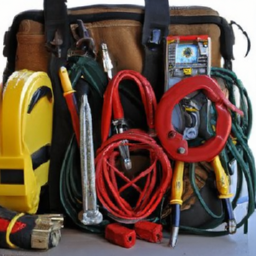Interested in becoming a lineman? If you’re ready to kickstart your career in the power industry, starting a lineman apprenticeship is a great first step. This article will provide you with valuable insights on how to begin your journey as a lineman apprentice, including the necessary qualifications, the application process, and what to expect from this dynamic and rewarding career path. So grab a pen and paper, because we’re about to walk you through the exciting world of lineman apprenticeships!
1. Understand the Role of a Lineman
1.1 What is a Lineman?
A lineman, also known as a utility lineman or powerline technician, is a skilled tradesperson who works on the construction, maintenance, and repair of electrical power transmission and distribution systems. They play a crucial role in ensuring that electricity is safely delivered to homes, businesses, and other facilities. Linemen often work on tall utility poles or in bucket trucks, working with power lines at high elevations.
1.2 Job Responsibilities
The primary responsibilities of a lineman include installing and repairing powerlines, transformers, and other electrical equipment. They also regularly inspect powerlines to identify and resolve any issues before they cause disruptions or safety hazards. Linemen must be able to read and interpret blueprints, operate specialized power tools, and possess knowledge of electrical systems and safety regulations.
1.3 Work Environment
The work environment of a lineman is often challenging and physically demanding. They frequently work outdoors in various weather conditions, such as extreme heat, cold, wind, or rain. Linemen must also be comfortable working at heights and in confined spaces. Additionally, they may need to respond to emergency situations, such as power outages or storm damage, which may require working long hours or being on call during evenings and weekends.
2. Research Lineman Apprenticeship Programs
2.1 Benefits of Apprenticeship Programs
Enrolling in a lineman apprenticeship program offers several benefits. First and foremost, it provides hands-on training and real-world experience, allowing you to learn directly from experienced professionals in the field. Apprenticeships also typically include classroom instruction, where you develop a solid foundation of technical knowledge. Furthermore, apprenticeships often provide a salary or stipend while you learn, allowing you to earn money as you gain valuable skills.
2.2 Accredited Programs
When researching lineman apprenticeship programs, it is important to ensure that you choose an accredited program. Accreditation ensures that the program meets specific standards of quality and provides education and training that is recognized by employers and industry organizations. Look for programs that are accredited by reputable organizations such as the National Joint Apprenticeship and Training Committee (NJATC) or state-approved agencies.
2.3 Eligibility Requirements
Each apprenticeship program may have specific eligibility requirements, so it is essential to review and understand them before applying. Common requirements may include a minimum age (usually 18 years old), a high school diploma or GED, a valid driver’s license, and passing a drug screening. Some programs may also require a certain level of physical fitness and aptitude for technical work.
2.4 Application Process
Once you have identified the apprenticeship programs you are interested in, familiarize yourself with their application process. The process may involve submitting an online application, providing supporting documents such as your high school transcripts or GED certification, and possibly taking an aptitude test. Be sure to carefully follow all instructions provided by each program and submit your application by the specified deadline.
3. Prepare for the Lineman Apprenticeship
3.1 Physical Fitness
Being physically fit is crucial for succeeding in a lineman apprenticeship. The work can be strenuous, requiring climbing poles and carrying heavy equipment. Engage in regular physical exercise, such as strength training and cardiovascular activities, to build endurance, strength, and flexibility. Additionally, maintaining a healthy lifestyle by eating nutritious foods and getting enough rest will contribute to your overall fitness levels.
3.2 Technical Skills
While apprenticeships are designed to provide on-the-job training, having a basic understanding of electrical systems and mechanical concepts is advantageous. Familiarize yourself with fundamental electrical concepts, circuitry, and basic safety precautions. Additionally, consider taking relevant courses or gaining experience in related fields, such as construction or electrical work, to develop foundational technical skills.
3.3 Safety Knowledge
Prioritize safety knowledge and procedures when preparing for a lineman apprenticeship. Linemen work with high-voltage electrical systems, and understanding safety protocols is vital to prevent accidents and injuries. Educate yourself on best practices for working with electricity, proper use of personal protective equipment (PPE), and emergency response procedures. Familiarize yourself with relevant Occupational Safety and Health Administration (OSHA) guidelines to ensure your safety and the safety of those around you.
4. Apply for Lineman Apprenticeship Programs
4.1 Gather Required Documents
Before completing the applications for lineman apprenticeship programs, gather all the necessary documents. These may include your high school transcripts or GED certification, a copy of your driver’s license, and any other supporting materials specified by the program. Having these documents readily available will expedite the application process and prevent any delays.
4.2 Complete Application Forms
Take your time when completing the application forms for lineman apprenticeship programs. Carefully read the instructions and provide accurate and detailed information. Double-check the forms for any errors or missing information before submitting them. Use clear and concise language to convey your qualifications, experiences, and enthusiasm for pursuing a career as a lineman.
4.3 Submit Applications
Once you have completed the application forms and gathered all the required documents, submit your applications by the specified deadline. Consider submitting your applications ahead of time to ensure they are received on time. Keep copies of your applications and any supporting documentation for your records. While waiting for a response, continue to explore other opportunities and additional apprenticeship programs to maximize your chances of acceptance.
5. Prepare for the Interview
5.1 Research the Company
Research the company or organization offering the lineman apprenticeship program to gather information about their operations, values, and goals. Familiarize yourself with their mission statement, recent projects, and any notable achievements. This knowledge will demonstrate your interest and dedication during the interview and allow you to ask informed questions about the company or program.
5.2 Practice Common Interview Questions
Preparing for the interview by practicing common interview questions will help you feel more confident and articulate during the actual interview. Consider questions such as why you are interested in becoming a lineman, your relevant experiences or skills, and how you handle working in challenging environments. Practice answering these questions aloud or conduct mock interviews with a friend or family member to refine your responses.
5.3 Dress Professionally
First impressions matter, so it is important to dress professionally for the interview. Opt for neat and clean attire that reflects a professional image. Traditional interview attire for men may include a suit or dress pants with a button-up shirt and tie. For women, a suit, dress, or dress pants with a blouse or blazer are suitable options. Avoid wearing excessive accessories or clothing that may distract from your qualifications and professionalism.
6. Pass the Aptitude Test
6.1 Understand the Test Format
Lineman apprenticeship programs often require applicants to pass an aptitude test to assess their mechanical and mathematical aptitudes. Research the test format and content to understand what to expect. The test may consist of multiple-choice questions that evaluate your understanding of electrical concepts, mechanical principles, and problem-solving abilities.
6.2 Review Math and Mechanical Concepts
To perform well on the aptitude test, review and refresh your knowledge of math and mechanical concepts. Focus on areas such as algebra, trigonometry, geometry, and basic physics. Practice solving math problems related to electrical circuits, Ohm’s law, and mechanical systems. Reviewing these concepts will boost your confidence and improve your performance on the aptitude test.
6.3 Practice Sample Questions
Practice sample questions that simulate the format and content of the aptitude test. Many lineman apprenticeship programs provide sample questions or study guides that can help you prepare. Time yourself while answering the questions to simulate the test’s time constraints. By practicing sample questions, you can familiarize yourself with the types of questions asked and develop effective strategies for approaching them.

7. Attend Lineman Apprenticeship Training
7.1 Classroom Instruction
Once accepted into a lineman apprenticeship program, you will undergo classroom instruction to learn the theoretical aspects of the trade. This instruction will cover topics such as electrical theory, safety regulations, power system operations, and blueprint reading. Pay close attention during these classes, take thorough notes, and actively participate in discussions to maximize your understanding of the material.
7.2 Hands-on Training
In addition to classroom instruction, hands-on training is a key component of a lineman apprenticeship program. You will have opportunities to apply the knowledge gained in the classroom to real-world scenarios. Under the guidance of experienced linemen, you will learn to operate tools and equipment, climb poles, install and maintain power lines, and troubleshoot electrical systems. Take advantage of these practical experiences to develop your skills and gain confidence in your abilities.
7.3 Safety Training
Safety is a top priority in the lineman profession, and apprenticeship programs dedicate a significant portion of training to safety protocols. You will receive comprehensive safety training to ensure you are aware of potential hazards and how to mitigate them. Topics covered may include electrical safety, fall protection, lockout/tagout procedures, and emergency response protocols. Always prioritize safety in your work and adhere to the safety guidelines provided by your apprenticeship program.
8. Learn from Experienced Linemen
8.1 Shadowing Opportunities
Taking advantage of shadowing opportunities allows you to observe and learn directly from experienced linemen. Shadowing allows you to see firsthand how professionals perform their duties, handle different situations, and apply their knowledge and skills. Shadowing also provides opportunities for mentorship and networking, as you can ask questions and establish relationships with experienced linemen who can offer guidance throughout your career.
8.2 Ask Questions
Don’t be afraid to ask questions when learning from experienced linemen. Ask about their experiences, seek clarification on specific tasks or procedures, and inquire about career advice. Seasoned linemen are often eager to share their knowledge and experiences with apprentices, as it helps to foster a culture of learning and professional growth within the industry. Be proactive and engage in conversations that will enhance your understanding and skill development.
8.3 Seek Mentorship
Forming a mentorship relationship with an experienced lineman can be invaluable in your development as a lineman. A mentor can provide guidance, share their knowledge and expertise, and offer support as you navigate your apprenticeship and career. Look for opportunities to establish mentoring relationships within your program or seek out industry organizations that facilitate mentorship connections. A mentor can provide valuable insights, advice, and encouragement as you work towards becoming a skilled lineman.
9. Complete On-the-Job Training Hours
9.1 Track Work Hours
As part of your lineman apprenticeship, you will need to complete a certain number of on-the-job training hours. These hours are essential for gaining practical experience and honing your skills in various aspects of the lineman trade. Keep detailed records of your work hours, activities performed, and the skills or tasks you have completed. Accurate record-keeping will not only demonstrate your commitment but also make it easier to meet the apprenticeship program’s requirements.
9.2 Gain Practical Experience
During your on-the-job training hours, focus on gaining as much practical experience as possible. Take advantage of the diverse tasks and responsibilities assigned to you, such as installing and repairing powerlines, troubleshooting electrical systems, and working with different types of machinery and equipment. Actively seek out opportunities to learn from experienced linemen and take on challenging tasks that will expand your skillset.
9.3 Follow Instructions
While completing your on-the-job training hours, always follow instructions provided by your mentor or supervisor. Pay close attention to safety guidelines and efficient work practices. Demonstrating your ability to follow instructions and work effectively as part of a team will not only ensure your safety but also earn the trust and respect of your colleagues. Stay focused, ask for clarification if needed, and approach each task with a positive attitude.
10. Obtain Necessary Certifications and Licenses
10.1 CPR and First Aid Certification
In the lineman profession, being prepared to respond to emergencies is vital. Obtain a CPR and First Aid certification to demonstrate your ability to provide immediate assistance in case of injuries or medical emergencies. These certifications are often required by employers to ensure the safety and well-being of both the linemen and the public.
10.2 CDL License
A Commercial Driver’s License (CDL) is a requirement for many lineman positions, as it allows you to legally operate the large and specialized vehicles used in the industry. Ensure you meet the age and eligibility requirements set by your state’s Department of Motor Vehicles (DMV), and undertake the necessary training and testing to obtain your CDL. Having a CDL not only expands your job opportunities but also demonstrates your commitment to the profession.
10.3 OSHA Certification
An Occupational Safety and Health Administration (OSHA) certification is necessary to ensure you have a thorough understanding of safety regulations and best practices. OSHA certifications may cover various topics, such as electrical safety, fall protection, and hazardous materials handling. By obtaining an OSHA certification, you demonstrate your commitment to safety and your ability to work in compliance with established standards.
By following these steps and putting in the necessary effort and dedication, you can embark on a successful career as a lineman. Remember, the lineman profession requires continuous learning and development, so never stop seeking opportunities to expand your knowledge and skills. Embrace the challenges and rewards of the lineman apprenticeship, and enjoy a fulfilling career in this essential and dynamic field.






